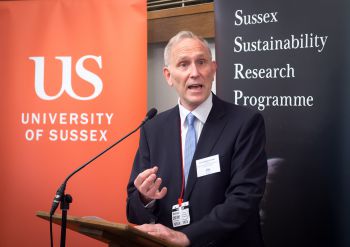Global governance must overcome zeitgeist of mistrust if world environmental issues are to be tackled effectively
By: Neil Vowles
Last updated: Tuesday, 2 April 2019

The growing mistrust and hostility towards global intuitions must be overcome if the world is to successfully tackle the environmental challenges it faces, the head of the University of Sussex’s global sustainability research centre has warned.
Professor Joseph Alcamo, Director of the Sussex Sustainability Research Programme (SSRP), said high-quality research and closer engagement with citizens around the world was needed to overcome the growing zeitgeist that viewed organisations such as the UN as meddling amid a geopolitical backdrop of cancelled treaties, neglected obligations and frozen negotiations.
Delivering his keynote speech at the 2018 Utrecht Conference on Earth System Governance this morning (Monday 5 November 2018), Prof Alcamo said: “To many people earth system governance is not beautiful, it is worrisome, it means loss of control over their lives, and this mistrust is a big part of the national retrenchment going on.
The former UN Environment Chief Scientist also said: “The research community must find a way to fight mistrust in the global institutions needed for implementing the Sustainable Development Goals, and to figure out how to implement the goals efficiently.”
Prof Alcamo warned those who believed in global governance would need to act in order to ensure that the major milestones achieved in 2015 including The Paris Climate Agreement, the 2030 Development Agenda, and the Sendai Framework were not part of the last wave of environmental globalism before the era of national retrenchment.
He said he believed there was a latent interest in global governance, illustrated by the one million tourists visiting the UN headquarters every year, and that engagement and cooperation through local civil society organisations and on-line could be vital to help rebuild trust.
Prof Alcamo said: “Even though I personally believe that we are morally obliged to achieve the SDGs – there are probably not enough important people in the world that feel the same way. But maybe, just maybe, they’ll be enough self-interest in the governments of the rich countries and private sector to propel the SDGs forward.
“Environmental protection and other societal goals are not a zero sum game. We can have it all and in fact we can’t have one without the other. Unfortunately this fallacy, this false dichotomy of a clash between economy and environment still has legs.”
